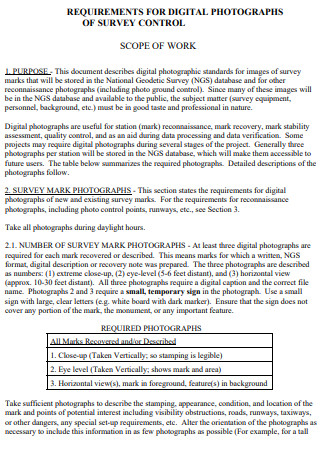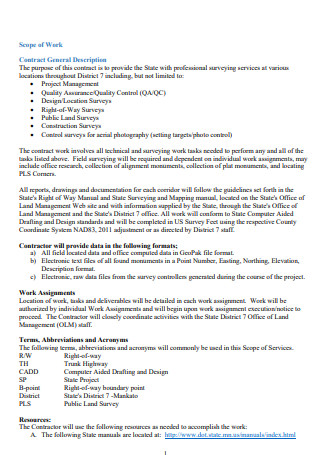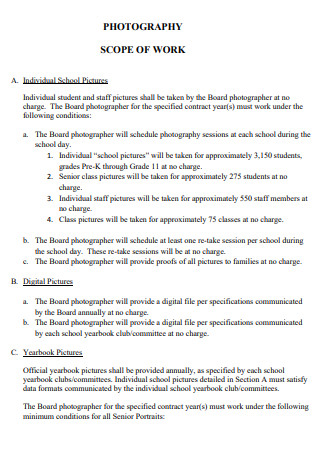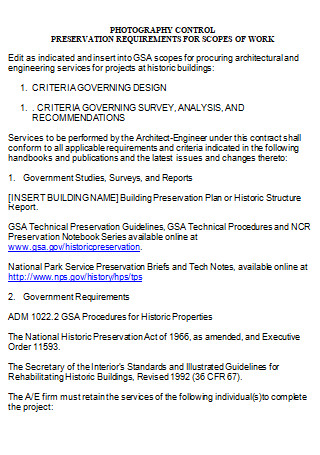3+ SAMPLE Photography Control Scope of Work
FREE Photography Control Scope of Work s to Download
3+ SAMPLE Photography Control Scope of Work
What is a photography control scope of work?
Photography Job Description
How to Become a Professional Photographer
Is photography a good career?
Is photography in demand?
What qualities should a photographer have?
What is a photography control scope of work?
The photography control scope of work pertains to the responsibilities and tasks of a photographer which dives deeper into simply taking photographs. Photography is a complicated line of work that requires a lot of planning, creativity, and even budget in order for the photographer to buy the necessary equipment and devices to be used at work. It is also worth taking note of that these equipment have to be maintained, and some photographers even put themselves in a place wherein keeping their devices up-to-date is a priority in order to keep up with current trends so as to attract more clients. If you are interested in taking photography as a profession, it is important for you to know the scope of work that you have to deal with once you are in it.
Photography Job Description
To be a photographer is to be a lot of things. To understand the scope of work you have to deal with once you become a photographer also means that you have to learn about the job description of being one. This allows you to be familiarized with the skills and knowledge you have to possess before entering your field. With it, you are able to prepare the necessary equipment and devices as well that will help you deliver your craft. Knowing the extent of your job is very important, as this is even exhibited when you apply for a corporate job wherein you have to thoroughly go through your contract in order for you to know your responsibilities and tasks, as well as your rights as a corporate employee. This is also where you get to learn the corporate bylaws that you have to follow. This is no different than learning the job description of being a photographer.
How to Become a Professional Photographer
Photography as a hobby is great, but imagine getting paid for doing what you love. A lot of us certainly dreamed of being a professional photographer at some point in our lives, and because of the progress our society has made in status quo, things like photography equipment as well as photography lessons are a lot more accessible to the general public. Basically, it is very possible for anyone with a budget and an internet connection to become a photographer. While that is a good start, it is also good to dream big, to the extent of truly being a professional photographer. This is also something very possible now, because of the existing agencies that can help you reach such an aspiration. With that being said, this is how you can become a professional photographer.
Step 1: Acquire the right photography education
While it is true that a talent for the arts is something you can inherently have, it is also worth considering that having a degree on your field makes you a more credible person to hire. You can very possibly opt to taking lessons on YouTube, for instance, which truly will help you become sharper in navigating your equipment, and in exploring the intricacies of your craft, but it is a very good look in curriculum vitae to have had a photography education. For college, you may choose a program that is in line with photography, or you may also take online courses regarding photography. Online courses are mostly the ones that are accessible to almost everyone, so it is strategic for you to choose this option in order for you to also still have the avenue to do other things in real life. When you are just starting out, always remember that any additional knowledge can help you. You may also join photography workshops, and events of the same sort.
Step 2: Get internships
Like any college program you may encounter, it is important for you to have internships in photography. You may apply to become an intern for an existing professional photographer. Not only will you have something fresh and impressionable in your curriculum vitae, but you also learn a lot from who you are working for. You can learn a lot of things during your internships, because you actually get to live the experience of dealing with clients, and operating a camera in order to capture photographs that are important and paid for. The photographer you will be working for could also hook you up to his network of contacts if you are able to perform well, and this will allow you to expand your contacts and put your name out there.
Step 3: Find your style
By this point, it is given that you have figured out what kind of photography you want to practice, whether it is fashion photography, wildlife photography, or whatnot. With that being said, the next step for you to take is to find your style as a photographer; something that makes your work yours. Just like how writers have their unique individual ‘voice’, photographers also ought to have something that makes them stand out from the others. You can do this through figuring out which parts of the picture you specifically like, for instance, and focusing more on that in your later photographs, or through exploring filters that are unique to you as a photographer. A color palette could also be one thing that makes your work unique. Generally, it truly is important for you to find a style that you like, and one that your clients, both existing and potential, will know you for.
Step 4: Save up for more equipment
While there is nothing wrong with just having one camera, it is worth considering that you need to have other options that you can choose from depending on which event you are photographing for, as well as supporting equipment that can help you perform better in your field. Professional photographers are those who work fast and well with photography equipment, and those who have backup devices when needed.
Step 5: Build your portfolio
Your portfolio is your canvas. Building your portfolio is very important because this is the very object that your clients will view in order for them to decide whether or not they want to hire you. Doing so also makes the job easier for you, as you would not necessarily have to recollect what you think are your favorite photographs when someone asks for your work. This allows you to automatically have something to show potential clients. Being preemptive with your portfolio also lets you sort out your favorite works, and gives you the allowance of time for you to correctly pick the best ones. Your portfolio truly defines you as a photographer, which is why you have to nurture your portfolio, and be selective in creating it, pushing forward an atmosphere that you would want to be remembered for.
Step 6: Market your business
Getting as many contacts of clients as possible is something that should be a priority for you as a photographer. While it is just as important for you to strengthen your existing connections, there truly is an added benefit if you start to outsource. You may market your business through attending photography conventions, launching a photography gallery, or through having an online page wherein your portfolio is visible to the public. Getting your work known through different ways truly is important, and can do wonders for your business.
Is photography a good career?
Photography is truly a path for the creatives, and even if it may be hard to establish yourself as a prestigious photographer, the journey of getting there truly has value in and of itself.
Is photography in demand?
According to sources, the field of work is expected to grow by 17% from the year 2020 to 2030. This is a much faster growth of demand as opposed to other fields of work.
What qualities should a photographer have?
Some of the qualities that a good photographer possesses are definitely creativity, a passion for the arts, an eye for detail as well as good angles, flexibility, and interpersonal skills since you are going to have to deal with clients. Expertise on digital equipment is also a very important skill to have as a photographer.
While it is not very popular to take such a risky line of work, it is truly very worth it especially if you are one who is very passionate about photography. The outcome will surely be very rewarding for you. With that being said, make sure that you understand the extent of the scope of work that you will be having once you take that kind of path. If the gravity of the responsibilities do not override your eagerness to take the job, then that is how you know it really is for you.




